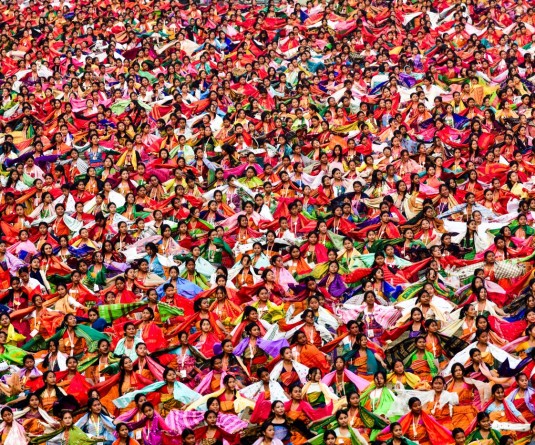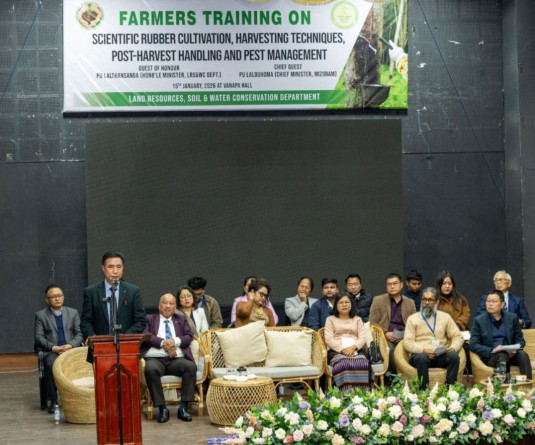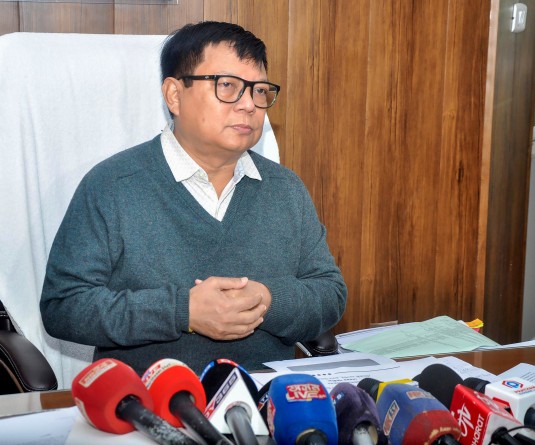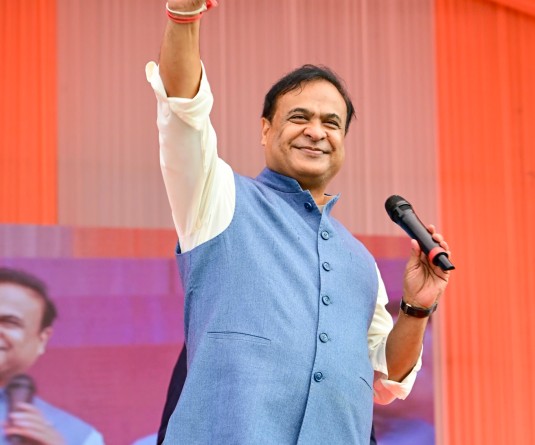
Guwahati, November 29 (AGENCIES): A noted Assamese writer, a peace broker between the outlawed United Liberation Front of Asom (ULFA) and New Delhi, and a teacher - Indira Goswami played many a varied role in a lifetime.
She died early on Tuesday at a hospital in Guwahati after prolonged illness . She was 69. Doctors said she died of multiple organ failure at the Guwahati Medical College Hospital. Known by her pen name, Mamoni Raisom Goswami, she had been a teacher at the Department of Modern Indian Languages at Delhi University.
Winner of India's highest literary award Jnanpith, Goswami acted as a peace broker between the outlawed United Liberation Front of Asom (ULFA) and New Delhi. But she gave it up in 2005. "Her death has created a void in the literary scene in India," Assam Chief Minister Tarun Gogoi said.
A resplendent woman wrapped invariably in an elegant red sari bordered in gold, Goswami was known for her radical writings - she saw social evils as few women of her class do. She stressed on several facets of women's empowerment in India - foremost among them were attitudes to girl children, marriage and widowhood.
Married at a young age to Madhaven Raisom Ayengar, an engineer from south India, she enjoyed happy matrimony for only 18 months. Then tragedy struck. Ayengar died in a car accident in Kashmir and Goswami found herself mentally and physically destabilized.The couple had no children.
In a moving autobiography, "Adhalekha Dastaveja", published in 1988, Goswami recalled how she shut herself in a small room in Goalpara and contemplated suicide, and how her only sustenance was the memory of a carefree childhood and the letters of her father.
In some confusion, she accepted a suggestion to choose a life in Vrindavan -- the most traditional destination of bereft Hindu widows.
One of the famous contemporary Indian writers, she is noted for her novels such as "Dontal Hatir Une Khowda Howda" ("The Moth Eaten Howdah of a Tusker"), "Pages Stained With Blood" and "The Man from Chinnamasta". "Adhalekha Dastaveja" ("The Unfinished Autobiography") is her autobiography.
She is the winner of Jnanpith, the highest literary award of India, in 2000 and Principal Prince Claus Laureate in 2008.
Considered an expert on the Ramayana literature, Goswami's voluminous works on the Assamese and Hindi Ramayanas have won her many laurels, including the International Tulsi Award, 1999, given by Florida International University, Miami.
She won the Sahitya Akademi Award in 1983 for her novel "Mamare Dhara Tarwal". Goswami's works have been translated into many Indian languages and English. The Library of Congress has 13 titles, including translations.
She died early on Tuesday at a hospital in Guwahati after prolonged illness . She was 69. Doctors said she died of multiple organ failure at the Guwahati Medical College Hospital. Known by her pen name, Mamoni Raisom Goswami, she had been a teacher at the Department of Modern Indian Languages at Delhi University.
Winner of India's highest literary award Jnanpith, Goswami acted as a peace broker between the outlawed United Liberation Front of Asom (ULFA) and New Delhi. But she gave it up in 2005. "Her death has created a void in the literary scene in India," Assam Chief Minister Tarun Gogoi said.
A resplendent woman wrapped invariably in an elegant red sari bordered in gold, Goswami was known for her radical writings - she saw social evils as few women of her class do. She stressed on several facets of women's empowerment in India - foremost among them were attitudes to girl children, marriage and widowhood.
Married at a young age to Madhaven Raisom Ayengar, an engineer from south India, she enjoyed happy matrimony for only 18 months. Then tragedy struck. Ayengar died in a car accident in Kashmir and Goswami found herself mentally and physically destabilized.The couple had no children.
In a moving autobiography, "Adhalekha Dastaveja", published in 1988, Goswami recalled how she shut herself in a small room in Goalpara and contemplated suicide, and how her only sustenance was the memory of a carefree childhood and the letters of her father.
In some confusion, she accepted a suggestion to choose a life in Vrindavan -- the most traditional destination of bereft Hindu widows.
One of the famous contemporary Indian writers, she is noted for her novels such as "Dontal Hatir Une Khowda Howda" ("The Moth Eaten Howdah of a Tusker"), "Pages Stained With Blood" and "The Man from Chinnamasta". "Adhalekha Dastaveja" ("The Unfinished Autobiography") is her autobiography.
She is the winner of Jnanpith, the highest literary award of India, in 2000 and Principal Prince Claus Laureate in 2008.
Considered an expert on the Ramayana literature, Goswami's voluminous works on the Assamese and Hindi Ramayanas have won her many laurels, including the International Tulsi Award, 1999, given by Florida International University, Miami.
She won the Sahitya Akademi Award in 1983 for her novel "Mamare Dhara Tarwal". Goswami's works have been translated into many Indian languages and English. The Library of Congress has 13 titles, including translations.
ULFA pay tribute to noted litterateur
Guwahati, November 29 (NNN): The anti-talk faction of Ulfa has condoled the death of noted litterateur of the state and one of the first initiators for peace talks.
In a condolence message signed by both Commander-in-chief Paresh Barua and newly appointed acting chairman of the outfit, Abhijit Bormon, the outfit said that Mamoni Raisom Goswami would be remembered in history for correctly presenting Ulfa’s goal, purpose and philosophy to Govt. of India. “Mamoni Baideu has a special place in the heart of every Ulfa member and we will remember her at every step of our movement,” the outfit said.
As a mark of respect to the departed litterateur, the outfit would organize a condolence meeting at every Ulfa unit on Wednesday and discussions on the noted litterateur’s life and contribution to literature.
Goswami was one of the first initiators for Govt.- Ulfa talks. For her peace efforts, Ulfa formed a citizens’ body, PCG (People’s Consultative Group) in 2005 to paving the ways talks with Govt. Three rounds of talks were held between PCG and Govt. of India. Her efforts to bring peace went in vein as the outfit did not drop its demand of sovereignty.
Guwahati, November 29 (NNN): The anti-talk faction of Ulfa has condoled the death of noted litterateur of the state and one of the first initiators for peace talks.
In a condolence message signed by both Commander-in-chief Paresh Barua and newly appointed acting chairman of the outfit, Abhijit Bormon, the outfit said that Mamoni Raisom Goswami would be remembered in history for correctly presenting Ulfa’s goal, purpose and philosophy to Govt. of India. “Mamoni Baideu has a special place in the heart of every Ulfa member and we will remember her at every step of our movement,” the outfit said.
As a mark of respect to the departed litterateur, the outfit would organize a condolence meeting at every Ulfa unit on Wednesday and discussions on the noted litterateur’s life and contribution to literature.
Goswami was one of the first initiators for Govt.- Ulfa talks. For her peace efforts, Ulfa formed a citizens’ body, PCG (People’s Consultative Group) in 2005 to paving the ways talks with Govt. Three rounds of talks were held between PCG and Govt. of India. Her efforts to bring peace went in vein as the outfit did not drop its demand of sovereignty.






